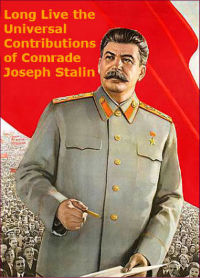 I have put together a comprensive study guide, broken up by subject, and shorter list of ten essential classics of Marxism-Leninism, all with the intention of making Marxist theory accessible, comprehensible, and practical, so that it may be used as weapon in the class struggle. In the same vein, here is an excerpt from Marxism-Leninism-Mao Zedong Thought as Guide to the Philippine Revolution by Armando Liwanag, Chairman of the Communist Party of the Philippines (1993) that also sheds some light on questions of Marxist study.
I have put together a comprensive study guide, broken up by subject, and shorter list of ten essential classics of Marxism-Leninism, all with the intention of making Marxist theory accessible, comprehensible, and practical, so that it may be used as weapon in the class struggle. In the same vein, here is an excerpt from Marxism-Leninism-Mao Zedong Thought as Guide to the Philippine Revolution by Armando Liwanag, Chairman of the Communist Party of the Philippines (1993) that also sheds some light on questions of Marxist study.
In 1959, a few young men and women, independent of the old merger party of the Communist and Socialist Parties, started forming study circles to read and study the works of Marx, Engels, Lenin, Stalin and Mao Zedong that could be gotten from secret collections. They initially did so amidst the open and legal studies about the problems of national independence and democracy. The Marxist-Leninist works that they read included the Communist Manifesto, Socialism: Utopian and Scientific, Wages, Prices and Profit, The Three Sources and Three Component Parts of Marxism, Imperialism: The Highest Stage of Capitalism, Two Tactics of Social Democracy, State and Revolution, The Foundations of Leninism, the Analysis of Classes in Chinese Society and Talks at the Yenan Forum on Art and Literature.
The most avid students of Marxism-Leninism read and studied Das Kapital, The Dialectics of Nature, Materialism and Empirio-Criticism, History of the CPSU (Bolsheviks), Short Course; the first edition of the Soviet-published Fundamentals of Marxism-Leninism and the Selected Works of Mao Zedong. The volumes of the selected works of the great communists began to reach the Philippines in 1962. To get hold of Marxist reading materials in the period of 1959-62 was by itself an achievement in view of the anticommunist hysteria and repressive measures since the end of World War II.
The objective of the beginners in the study of Marxism-Leninism was to seek solutions to what they perceived as the fundamental problems of the Filipino people, use Marxism-Leninism to shed light on the history and concrete circumstances of the Filipino people and find ways to resume the Philippine revolution and carry it out until victory. In the study of Marxism-Leninism, with special reference to the Philippine revolution, they sought to grasp the three components of Marxism, which are materialist philosophy, political economy and scientific socialism as laid down by Marx and Engels, developed by Lenin and Stalin and further developed by Mao Zedong.
The beginners in the study of proletarian revolutionary theory were exceedingly receptive to Mao’s teachings because of their proven correctness and success in so vast a country neighboring the Philippines and their recognized applicability to the Philippines. The most read works of Mao Zedong were On Contradiction, On Practice, the Analysis of Classes in Chinese Society, The Role of the Chinese Communist Party in the National War, Problems of Strategy in Guerrilla War Against Japan, On Protracted People’s War and On New Democracy.
The fruits of this study, theoretically, is to be found in the analysis that the CPP developed. See the CPP History page and the CPP Documents page at philippinerevolution.net.
Like this:
Like Loading...
Posted in Books, Classics, Marxism-Leninism, Philippines, Theory
Tagged Armando Liwanag, Communist Party of the Philippines, Engels, Lenin, Mao, Marx, Marxism-Leninism, People's War, Philippines, Revolution, Stalin, study guide, theory


























